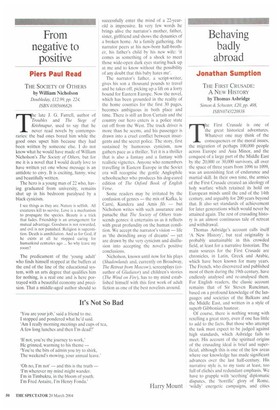From negative to positive
Piers Paul Read
THE SOCIETY OF OTHERS by William Nicholson Doubleday, £12.99, pp. 224, ISBN 0385606826 The late J. G. Farrell, author of Troubles and The Siege of Krishnapur, used to say that he never read novels by contemporaries: the bad ones bored him while the good ones upset him because they had been written by someone else. I do not know what he would have made of William Nicholson's The Society of Others, but for me it is a novel that I would dearly love to have written yet one whose message is an antidote to envy. It is exciting, funny, wise and beautifully written.
The hero is a young man of 22 who, having graduated from university, remains shut up in his bedroom paralysed by a black cynicism.
I see things as they are. Nature is selfish. All creatures kill to survive. Love is a mechanism to propagate the species. Beauty is a trick that fades. Friendship is an arrangement for mutual advantage. Goodness is not rewarded, and evil is not punished. Religion is superstition. Death is annihilation. And as for God, if he exists at all he stopped caring for humankind centuries ago ... So why leave my room?
The predicament of the 'young adult' who finds himself stopped at the buffers at the end of the line of the educational system, with an arts degree that qualifies him for nothing, is a real one and is here portrayed with a beautiful economy and precision. That a middle-aged author should so successfully enter the mind of a 22-yearold is impressive. In very few words he brings alive the narrator's mother, father, sister, girlfriend and shows the dynamics of a broken home. At a family gathering, the narrator peers at his new-born half-brother, his father's child by his new wife: 'it comes as something of a shock to meet those wide-open dark eyes staring back up at me and to know without the possibility of any doubt that this baby hates me'.
The narrator's father, a script-writer, gives his son a thousand pounds to travel and he takes off, picking up a lift on a lorry bound for Eastern Europe. Now the novel, which has been grounded in the reality of the home counties for the first 30 pages, becomes ambiguous in both place and time. There is still an Iron Curtain and the country our hero enters is a police state cut off from the West. The truck driver is more than he seems, and his passenger is drawn into a cruel conflict between insurgents and the secret police. The story, first sustained by humorous cynicism, now gathers pace as a thriller. Yet it is a thriller that is also a fantasy and a fantasy with realistic vignettes. Anyone who remembers travelling in Eastern Europe in the Soviet era will recognise the gentle Anglophile schoolteacher who produces his dog-eared edition of The Oxford Book of English Verse.
Some readers may be irritated by the confusion of genres — the mix of Kafka, le Carre, Kundera and Amis fils — but Nicholson writes with such assurance and panache that The Society of Others transcends genres: it entertains us as it reflects with great profundity on the human condition. We accept the narrator's vision — life as 'the dwindling away of dreams' — yet are drawn by the very cynicism and disillusion into accepting the novel's positive conclusions.
Nicholson, known until now for his plays (Shadow/ends and, currently on Broadway, The Retreat from Moscow), screenplays (coauthor of Gladiator) and children's stories (The Wind on Fire), has to my mind established himself with this first work of adult fiction as one of the best novelists around.


















































































 Previous page
Previous page